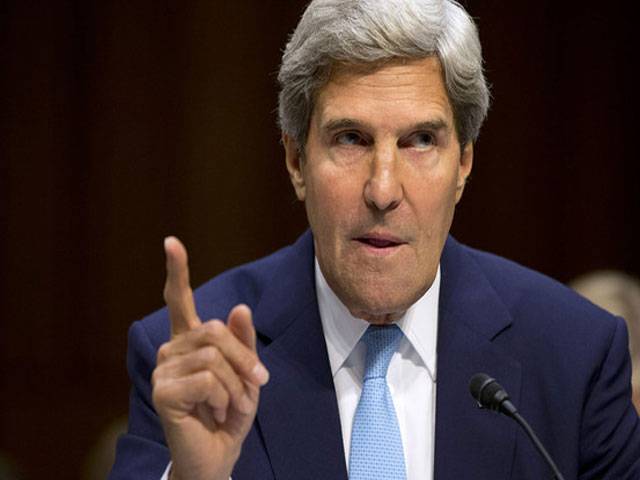WASHINGTON - The US State Department has not received any letter from two leading lawmakers voicing concern over Pakistan’s failure to take “meaningful action” against key terrorist groups operating on its soil and urging Secretary of State John Kerry to take coercive steps so that Islamabad cuts all ties with those groups.
“I have not seen the letter,” State Department Spokesperson Jen Psaki told reporters when an Indian correspondent drew attention to the letter from Congressmen Ed Royce, Chairman of the House Foreign Affairs Committee, and Eliot Engel, the Committee’s Ranking Member.
“I can’t confirm for you if the Secretary has received it. I’m sure we will respond to the letter as we do from any letter from a member of Congress,” she added.
The letter, dated February 12, which was posted on the Congressional website, asked Secretary Kerry to pursue a different approach with the Pakistani government. “We urge you to consider implementing travel restrictions, suspending portions of assistance, and sanctioning Pakistani officials that maintain relationships with designated terrorist groups. Such an approach would make clear that the US and Pakistan cannot have a true strategic partnership until Pakistan cuts all ties with terrorist organisations and renounces its use as an instrument of state policy.”
“We remain deeply concerned that Pakistan has failed to take meaningful action against key Islamist terrorist groups operating within its territory,” Congressmen Ed Royce, Chairman of the House Foreign Affairs Committee, and Eliot Engel, the Committee’s Ranking Member, said in a letter to Kerry.
“Like you, we were horrified by the December attack on the Army Public School in Peshawar which killed almost 150 people, mostly school children. This recent attack has only heightened our concerns” they said.
The letter said while the government of Pakistan has taken some steps to disrupt al-Qaeda and the Tehrik-e-Taliban Pakistan (TTP), it has done much less to combat other designated foreign terrorist groups such as Lashkar-e-Tayyiba (LET), Lashkar-e-Jhangvi, and Jaish-e-Muhammad. This selective approach appears to stem from a misguided belief that some terrorist groups serve Pakistan’s foreign policy goals in India and Afghanistan.
“We appreciate that you and other senior level administration officials regularly raise the need to confront these groups with Pakistani officials. Yet it does not appear that this engagement has resulted in any real change in Pakistan’s policies.”
At the same time, Royce and Engel said, “We welcome Pakistan’s recent announcement that it will soon ban the Haqqani network, but are sceptical that this will result in any real change to Pakistan’s policy.”
“After all, groups like LeT and JuD are ostensibly banned and still able to operate with virtual impunity,” the two Congressmen wrote.
“Just days ago, on January 25, JuD held a rally in Karachi that appeared to have taken place with government permission. Indeed, given Pakistan’s history of support for terrorist groups, we are concerned that an outright ban will never come,” they said.
They said Pakistan has been devastated by terrorism. Indeed, in 2013, more than 3,000 Pakistanis were killed as a result of terrorist attacks. Thousands of Pakistani soldiers have been killed and local communities have been brutalised. If Pakistan’s long-term prospects are to improve for its people, its leaders must make a clear break from the policies of the past.
They appreciated Kerry’s personal commitment to the US-Pakistan relationship and said they look forward to working with him to address this issue and other critical foreign policy matters in the coming year.
Tuesday, May 21, 2024
US Congressmen for cut in Pakistan aid
| Asks Kerry to place restrictions on officials backing militants | State Department unaware of letter written to secretary of state

9:31 PM | May 20, 2024
8:17 PM | May 20, 2024
Every institution should work within constitutional limits: Tarar
9:54 PM | May 20, 2024
Govt tables defamation bill in Punjab Assembly amid strong opposition protest
9:52 PM | May 20, 2024
ATC dismisses Parvez Elahi's bail petition in Jinnah House attack case
9:36 PM | May 20, 2024
PTI founder Imran Khan, others acquitted in Azadi March vandalism case
9:35 PM | May 20, 2024
Tarar rules out unilateral legislation for establishment of Digital Media Authority
9:34 PM | May 20, 2024
Safety Ensured
May 20, 2024
Seizing Solar Power
May 20, 2024
Following Elders
May 20, 2024
NEPRA’s Neglect
May 19, 2024
Colonial Grip
May 19, 2024
Contumacious Political Cult
May 20, 2024
Balochistan: A Tourism Hub
May 20, 2024
Energy Taxes: A Heavy Burden
May 20, 2024
Unsung Heroes of Society
May 19, 2024
Water Shortage in Our Area
May 19, 2024
ePaper - Nawaiwaqt
Advertisement
Nawaiwaqt Group | Copyright © 2024





